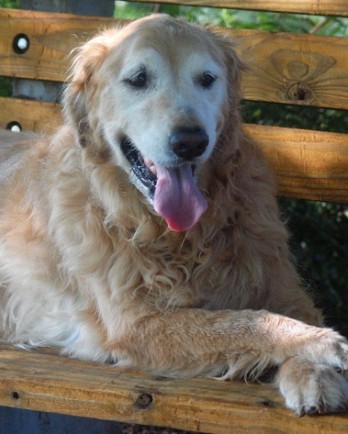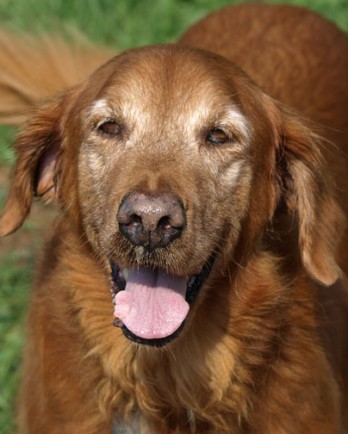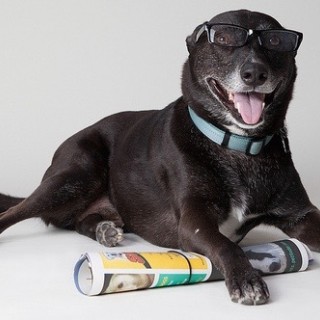The Joy of a Real Home: Creating a Senior Dog Sanctuary for Old Goldens by Robin Adams
Delaware Valley Golden Retriever Rescue (DVGRR), founded in 1993, is a 501(C)(3) nonprofit caring for homeless Golden Retrievers in Pennsylvania and surrounding states. A grant from The Grey Muzzle Organization helps fund medical care to get DVGRR's senior dogs ready for adoption. Located in in Reinholds, PA, the heart of one of the country's largest puppy mill areas, DVGRR created Project Home Life in 2009 to help puppy mill survivors transition successfully into normal homes. Their BARK on-site hospital opened in 2011, and The Lynne Glennon Sanctuary for Senior Goldens and Puppy Mill Survivors in 2014. In this post, contributor Robin Adams, DVGRR Founder and Executive Director, describes how they came to build their senior sanctuary facility.
Since 1993, Delaware Valley Golden Retriever Rescue (DVGRR) has successfully placed over 4,000 Golden Retrievers and other dogs into new homes throughout eastern Pennsylvania, Delaware, Maryland, New Jersey, and beyond. Having been in rescue for over 20 years, we are very familiar with the challenges faced by sugar-faced seniors. With a few golden-hearted exceptions, many adopters have shied away from the older dogs in our program because of concern about "losing the dog too soon."
In 2000, DVGRR opened our dedicated facility, Golden Gateway, as we were outpacing our foster home model and concerned about dogs "slipping through the cracks." Within a decade, we started to feel a bit pinched for space, and in 2013, the adjacent property came on the market. Thanks to generous support from our DVGRR family, we were able to make the purchase to create The Lynne Glennon Sanctuary for Senior Goldens and Puppy Mill Survivors (LGSS).
This purchase coincided with similar work being done by the Golden Retriever Senior Rescue Sanctuary and Educational Center in the northeast. Their plans hit a rock... literally, a huge slab of underground granite that upended the building expansion that would have served as home to abandoned seniors. Thus, they generously agreed to throw their support behind our efforts and help underwrite the costs of operations at LGSS.
So we had a property and began brainstorming about the best way to renovate the ranch home to serve the needs of a very precious population: the senior dogs and the greater number of puppy mill survivors, many of them seniors who no longer could breed, who were arriving at our doorstep. We had years of feedback from adopters regarding the challenges these dogs faced when moving into their forever homes.
Let the renovations begin! We separated the living area from the kitchen with a half wall including a sliding solid gate to separate dogs as needed without limiting the sight lines between the areas. The dining area became "central command" with a work station that includes monitors for the security cameras throughout the building. Staff can monitor dogs without disturbing them - very important during the first days for puppy mill survivors. The bathroom was gutted to become a grooming room. Dutch doors were added to all three bedrooms that serve as dogs' primary living areas. Closet doors were removed to create nooks for dogs that prefer a more secluded safe space.
The lower level was renovated to include a large room for dog and human interaction... and it provides us with a great meeting room as well. A second kitchenette and bathroom were added. We also created a sound-proof "thunder room" where we can sit with our storm-phobic dogs when needed. We overhauled the staircase to include both open and closed risers for dogs to learn to become accustomed to both.
Our first official LGSS resident was a dog we named Prince Charles... both a senior and puppy mill survivor. He was a dog with remarkable lineage that suffered twelve horrible years in a puppy mill. While we'll never know how he ended up in a puppy mill or what horrors he endured there, we do know that he was able to live his final years with the love, comfort, and plenty of TLC that every dog deserves.
With the Sanctuary we are able to help every senior dog either find a forever home, or live out their days under the care of our loving staff and volunteers. Additionally, we have expanded our Project Home Life program to help rehabilitate puppy mill survivors to acclimate to life in a typical household, not relegated to survive in a wire hutch or other atrocious living conditions.
One of the most important things we provide for our senior dogs is expansive veterinary diagnostic care. Our standard procedure for all dogs seven and older is for two X-rays: chest and abdomen to help rule out masses and other underlying issues. We also conduct a 23-panel blood test (done for all dogs in our program) that also provides better insight into a dog's health. We give adopters the test results and a copy of the digital X-rays, so they can give those to their own vets as part of the dog's veterinary record.
To enhance senior adoptions, DVGRR also offers the Seniors for Seniors program in which we match senior dogs with adopters 65 years old and older. The adoption fee is reduced, and we also provide ongoing wellness exams and prescription medication at reduced cost.
We receive letter after letter every week from those who have adopted senior dogs, extolling the unconditional love that is shared by both the dogs and the people. We are forever grateful to our DVGRR family that so generously allowed us to attain and develop our sanctuary. It is making a huge difference for countless dogs.
To learn more about Delaware Valley Golden Retriever Rescue, visit www.dvgrr.org.
For information about all of the wonderful organizations that Grey Muzzle supports, see Who We Help.
The Grey Muzzle Organization improves the lives of at-risk senior dogs by providing funding and resources to animal shelters, rescue organizations, sanctuaries, and other nonprofit groups nationwide.




